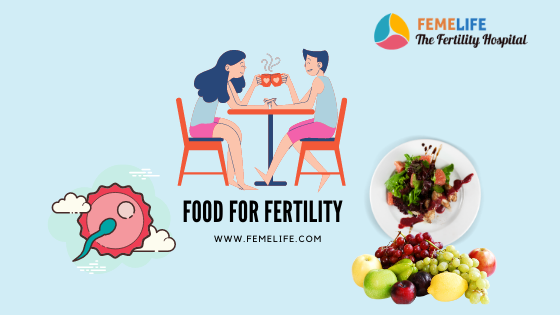Fertility issue affects the 20 % of couples now a days. The life to parenthood can sometimes be a huge challenge. Luckily, there are a few natural ways to increase and develop fertility. In fact, food choices and lifestyle changes can help boost the human fertility. Food for fertility includes vitamins and protein rich food, vegetables and fruits.
Antioxidants for fertility diet
Fertility diet -Antioxidants like folate and zinc may also improve fertility for both men and women. In young and adult men found that eating 75 grams of antioxidant-rich walnuts per day which improved sperm quality and quantity. Women taking higher folate intake have higher rates of implantation and pregnancy.
Fertility foods like as fruits, vegetables, nuts, and grains are full of beneficial antioxidants. They contain vitamins C and vitamins E, folate, beta carotene, and lutein. Eating more of these healthy foods will not affect the diet.
Avoid trans fats in fertility food plan
Eating more healthy fats every day is important for boosting fertility and overall health. The trans fats foods have increased risk of ovulatory infertility, due to their negative effects on insulin sensitiveness. Trans fats are common in hydrogenated vegetable oils. They are usually present in some margarine, fried foods, processed products, and baked goods .
Taking a diet higher in trans fats and lower in unsaturated fats can lead to infertility for both men and women.
Fertility Food Chart – Cut down on carbs
Following a low carbohydrates (where less than 45 percent of calories come from carbs) is generally recommended for women with PCOS.
Several studies have indicated that managing carbs intake provides more beneficial effects on some aspects of PCOS.
Lower carbs diets may also help to maintain the healthy weight, reduce insulin levels, and encourage the fat loss, and also helping menstrual regularity.
Eat fewer refined carbs for fertility diet
Speaking of carbs: It’s not just the amount of carbs intake where that’s important, but also the types.
Bad carbohydrates that could also be especially problematic. Refined carbs include sugary foods and drinks and processed grains, including white pasta, bread, and rice.
These carbs causing spikes in blood glucose and insulin levels due to easy absorption. Refined carbs even have a high glycemic index (GI). The GI tells you if a carbohydrate-dense food will raise your blood glucose significantly.
Insulin is chemically almost like ovarian hormones. These hormones help our eggs mature. Consistent elevated insulin can cause the body to supply fewer reproductive hormones because it thinks it doesn’t need it. this will contribute to a scarcity of egg maturation and ovulation.
Given that PCOS is related to high insulin levels, refined carbs can make it even worse.
Add more fiber to your fertility food
Fiber helps your body get obviate excess hormones and keeps blood glucose balanced. Certain sorts of fiber can help remove excess estrogen by binding thereto within the intestines. The surplus estrogen is then faraway from the body as a waste.
Soluble fiber from fruit which is especially had the strongest association with lower concentrations of estrogen.
Some samples of high fiber foods are whole grains, fruits, vegetables, and beans. The daily recommended intake of fiber for ladies is 25 grams per day and 31 grams for men.
One 2009 study found that eating 10 grams more cereal fiber per day was related to a 44 percent lower risk of ovulatory infertility among women older than 32 years.
However, the evidence on fiber remains mixed. Another study of 250 women aged 18 to 44 showed that increasing fiber by 5 g per day decreased hormone concentrations with a better probability of anovulation (when ovulation doesn’t take place).
Check with your doctor on your current fiber intake to ascertain if you ought to be eating more.
Add in a multivitamin
If you take multivitamin, you will be much less possibly to revel in ovulatory infertility. 20 % of ovulatory infertility are due to imbalance in diet. Young girls should eat more multivitamins to maintain fertility. Micronutrients discovered in nutrients have vital roles in fertility. For girls looking to get pregnant, a multivitamin containing folate can be specifically beneficial. Have a talk together along with your physician approximately dietary supplements together with any multivitamins that would assist get you toward pregnancy.
Get active
Exercise also benefits for the health, to including increased fertility. Increasing moderate physical activity has positive effects on fertility for ladies and men, especially those with obesity.
The trick is that moderation is vital. Excessive high intensity exercise can cause decreased in fertility in certain women.
Excessive exercise and yoga may change the energy balance within the body, and negatively affect your genital system. If you propose to extend your activity, add it gradually and confirm your healthcare team is aware.
See if the doctor is in favor of you adding these exercise and yoga poses to your routine.
Take time to relax
If you’re trying to conceive, stress is perhaps on the menu, too. the stress levels increase, your chances of getting pregnant will be decrease. This is often likely thanks to the hormonal changes that occur once you feel stressed.
There is a link between stress and fertility, stress can suppress fertility. Avoid environmental pollution like harmful chemicals & noise pollution.
Receiving support and counseling may reduce anxiety and depression levels of the women, and increase your chances of becoming pregnant.
Cut the caffeine from fertility food plan
The diet of fertility association between caffeine and fertility isn’t very conclusive.
One older 1997 study suggests that ladies who consume quite 500 milligrams of caffeine daily take up to 9months to urge pregnant.
However, other studies didn’t find a robust link between caffeine intake and an increased risk of infertility.
Consider limiting your caffeine intake to at least one or two cups of coffee per day to get on the safe side. Give these non-coffee options a try.

